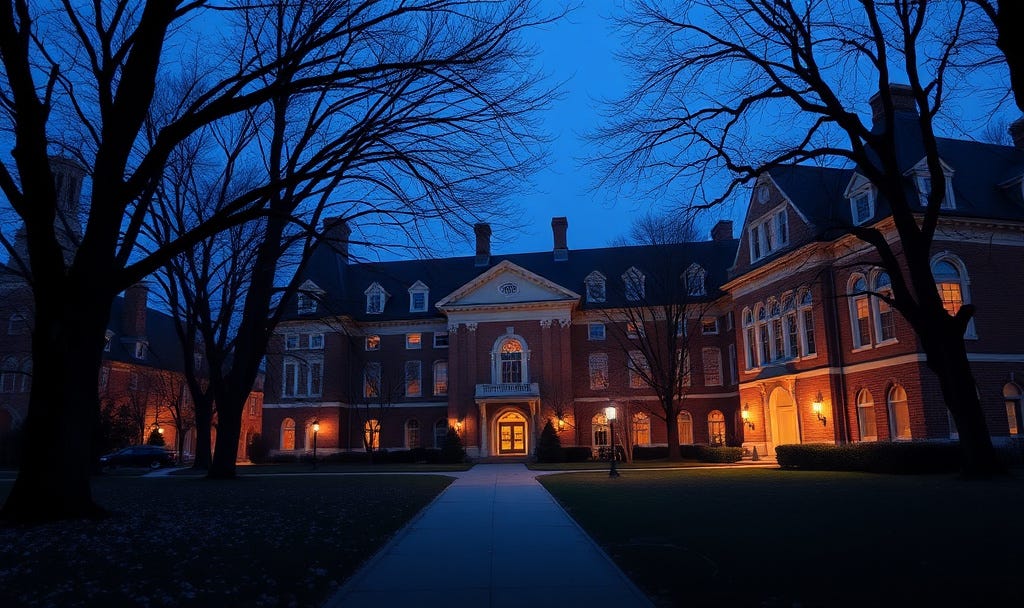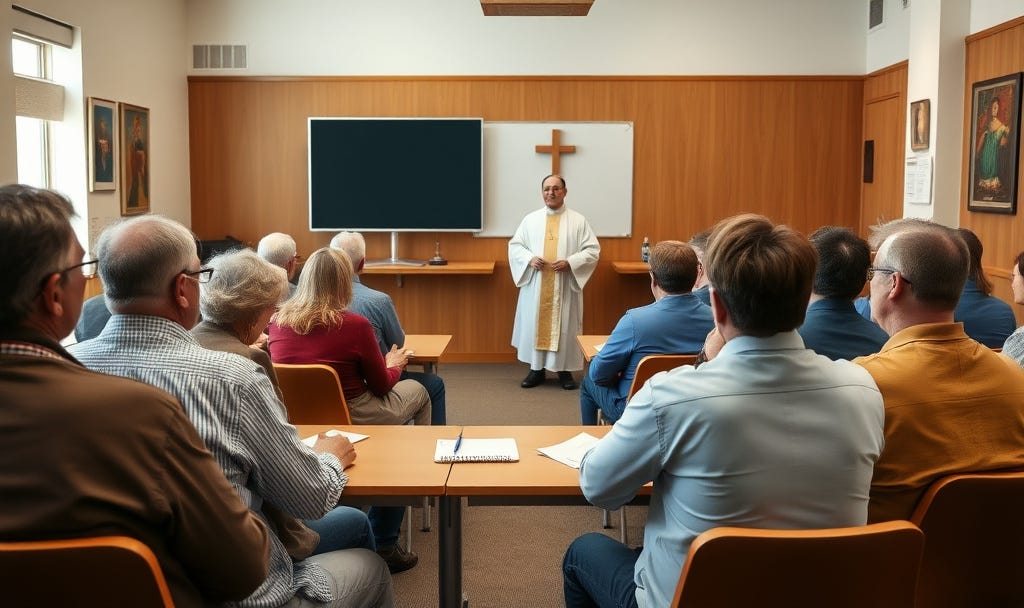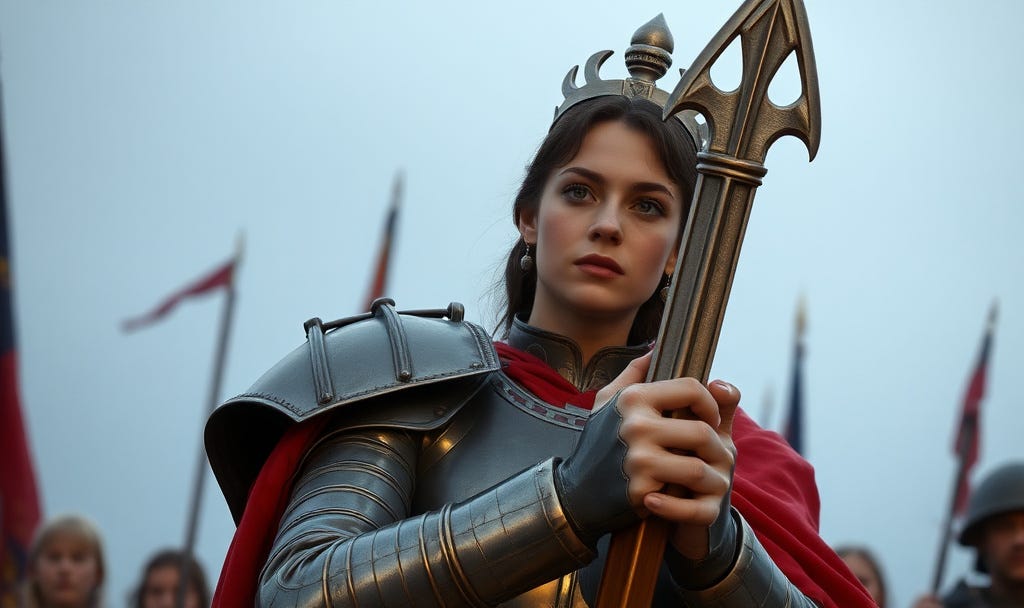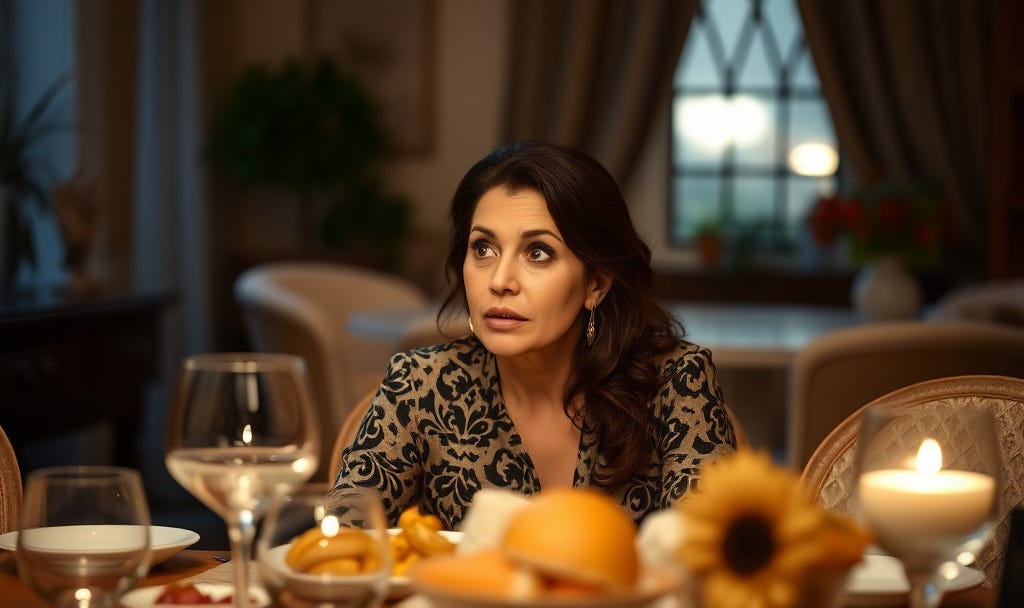Chapter 8 - Journey to Christendom (Third Edition)
Struck Down with the Dogma of Love

Now we come to the moment in my life that is permanently branded into the core of my being. This moment changed the course of my visible, chronological life and, even more, my whole interior being. I sensed immediately that what happened to me had transcended space and time. An eternal power touched me. It simply Was. It was the I Am. In that moment, for the first time in my temporal history, this living power struck me.
When this kind of moment happens, you know it. You do not just “understand” an eternal truth outside of space and time in a purely intellectual way. That would be far too superficial. Mere intellectual understanding can look, even in hindsight, like a natural development of your thinking, a psychological shift, an emotional turning point. No—this is different. You experience it. You feel it. You sense that this moment is alive.
It hits you as a power beyond you and outside of you, like a bolt of lightning. It is the work of an objective God—God as a real Person, with a will and a personality—reaching into your soul and leaving a branded mark still faintly wreathing in smoke. It is like staring at a black-and-white picture and suddenly, in a single instant, seeing the colors splash onto the canvas in a completely ordered way. You are stunned, but you also realize: This is how the image truly is, how it has always been for those who could see. You can no longer even imagine wanting to go back to the old view. Life is just different then, and there is no going back.
That is what happens when the Holy Spirit of the Almighty God, the Third Person of the Holy Trinity, touches your soul. It is powerful and beautiful. It leaves you fearing God and understanding, perhaps for the first time, that the fear of the Lord truly is the beginning of wisdom.1 You love, adore, and fear God all at once. You fall to your knees before Something infinitely great, realizing that you are both an unworthy sinner and deeply loved—held in a paradox that somehow also restores your dignity.
And you know it is an objective reality, even though it is subjectively experienced, because this same encounter has been described by Catholics through the centuries in remarkably similar ways. That moment was, for me, the true beginning of my journey to Christendom. It was when God took the stirrings and providential hints from my youth and energized them, putting them into an orderly movement toward the great land.
Experiences like these are difficult to explain to others. Let me give you an example of why. When you talk about religion or spirituality with an atheist or with someone generally opposed to the Catholic faith, the conversation very quickly becomes a debate about philosophies and ideas. The atheist may assume that you are not especially intelligent for holding your beliefs and may even present a persuasive argument. You trade words back and forth, but the whole conversation is framed as if Christ and his Church were abstract concepts to be weighed and analyzed. It is assumed—often unconsciously—that human reasoning alone will decide the issue. That assumption already gives the first victory to materialism before you even begin.
It is like arguing with someone about the reality of lightning when you have just been struck by lightning. How can you explain what the lightning strike did to you if the other person refuses to believe lightning exists, or insists that if anything happened at all, it was merely in your mind? They will let you say you “felt” something, but they deny that anything objective actually occurred. What can you say to that?
That is the difficulty I face here. And there is another difficulty as well. When I describe what actually happened, it will not sound dramatic. It will not sound like a lightning strike. You may be tempted to say, “Is that it? Didn’t you levitate to the heavens? Didn’t streams of light pour down while a deep, booming voice shook the room? That’s what I was expecting.” The answer is no, none of those things happened. Yet I can tell you this: the moment affected me as if they had. I have never been shaken free from it. Whenever I have wandered too close to the edge of some deceptive philosophy, this experience has snapped me back to truth like a bungee cord pulling a falling body back from the brink.
To help you understand the Great Event, I should first tell you briefly what happened when I left Guymon to go to college.
I attended Princeton University after being accepted at top-tier schools such as Yale, Dartmouth, Brown, Rice, and Stanford. I arrived in the fall of 1977. The Ivy League atmosphere thrilled me. Imagine a young man from the small, isolated town of Guymon walking into the great halls of one of the world’s most prestigious universities. My peers intimidated me. My professors were often notable scholars.
My first Economics lecture was taught by Burton Malkiel, former Chairman of the Council of Economic Advisers for President Jimmy Carter and author of the famous book A Random Walk Down Wall Street. My head spun with a kind of proud satisfaction. I believed I had arrived at a place that would set me, now and forever, above the “ordinary” people of the world.
Years later, as a senior, I would ask the most recent Nobel Prize winner in Economics to be my senior thesis advisor. He refused—rather rudely—and made it clear he would not be anyone’s advisor. But I was strangely unbothered. These were the kinds of people I was now dealing with. To be turned away by a Nobel Prize winner—how many people can even tell a story like that? Yes, I was turned away, but I had been close enough to ask. That was how I thought.
Intellectual pride tightened its grip on me at Princeton. During my sophomore year, I began to shrink toward self-centeredness and a kind of slavery to my senses. The people back in Guymon would not have recognized me, and rightly so. To my shame, I had become a very different person. This part of my story is important but secondary. I will not go into all the details here. It is enough to say that the “Revolution” was being born in my soul. Why worry about religion, I thought, when someone as “gifted” as I was could build his own kingdom and have “fun, fun, fun ‘till your daddy takes your T-bird away” at the same time? That is the Revolutionary spirit: the worship of self, of pleasure, and of power.
Clouds were gathering on my horizon. The innocence of my youth was being sacrificed on the altar of the world and of the Revolution. I heard the low, seductive whispers from the dark netherworld, and their promises attracted me. Darkness started to smother those early stirrings of contemplation that had arisen so gently when I gazed as a boy across the vast horizon of the Oklahoma Panhandle. It would be a slow, agonizing death march that stretched over many years.
Now, think for a moment about what the greatest imaginable miracle might be. Would it not be this: that such a miserable, slow death could be transformed into a new life—one more wonderful than the old life—with the promise of eternal resurrection, all without losing your own unique personhood?
If you follow Eastern New Age thinking, you may believe that death can lead to another form of life, but often in a way that seems impersonal, as if you dissolve into a great cosmic “nothingness” and then reappear in a new form. If you are an atheist, then as far as I can tell, your position is simple: you die, and that is the end. There is nowhere else your Reason can take you. It is straightforward: no God, no spiritual world, no afterlife, just death. It is a linear view, and in one sense, it is intellectually consistent. But being consistent does not make it true. Many ideas “make sense” on their own terms and yet are still false.
The personal resurrection I am speaking of is different. It would require a personal God, because such a miracle—raising you in your personhood—could only come from a personal Being. This is far more magnificent than anything Eastern religious thought could offer, and it is obviously a better hope than the dead end of atheism. This is worth contemplating as you continue reading my story.
After graduation, I began my professional career with a large corporation, but in time I returned to Guymon to help my father with the family business. I moved back in January of 1984. That year would be the most important year of my life. It was in 1984, after coming home, that the Great Event took place. But several significant things led up to it.
First, I was reintroduced to that beautiful young woman I mentioned in the previous chapter. Her brother worked in our plant while attending night classes at the local college. He recognized me from my high school basketball days and came into my office one day to tell me that his sister was in town.
I had only slightly more courage then than I did back in high school. It may have been courage, or it may have been sheer bravado, but I asked her out on a date. Within a day or two, we saw each other for the first time in seven years. That brief eye contact we had exchanged back in high school had somehow held steady over all that time, and now it was blossoming into an actual date. Some seeds take a while to sprout.
Later, I learned that she had been praying for us to get together for all seven of those years. That detail is important. It tells you something about her character and her faith. And it is certainly not the last time in this story you will hear about her praying for me.
In the fall of 1984, I began attending classes for the Rite of Christian Initiation for Adults (RCIA) at the local Catholic parish in Guymon, St. Peter’s—yes, the same church I had ignored throughout my youth.
The story of how I came to walk into RCIA is simple enough, and every man reading this will understand immediately. I was there because I wanted to marry that beautiful young woman—the one I had flirted with in high school, the one I finally asked out seven years later, the one who is now my wife.
Josey is a cradle Catholic. She explained things to me very clearly. She told me she would marry me, but that she was Catholic and would always remain Catholic. Our children would have to be Catholic, and I would have to go to Mass with the family. Other than that, she assured me, I was free to be whatever faith I wanted.
This was not presented as a question or an opening for dialogue. It was my first serious encounter with something like a dogmatic pronouncement. At that point, thoroughly infected by the Revolutionary spirit I have been describing, I did not truly “believe” in anything. I did, however, know one thing: I wanted to marry her. So I agreed to her conditions on the spot. There were no negotiations. Her willingness to marry me made me feel I had already won. I was not about to let something as “small” as religion spoil my victory.
A few weeks later, the priest who was going to marry us suggested that I might want to know a little about my future wife’s faith. That sounded reasonable enough. He recommended I attend at least a few RCIA classes. I agreed.
I was, generally speaking, a decent sort of fellow, though quite arrogant about my supposed intellectual superiority. Still, I listened respectfully to the priests and the deacon who ran the program. The classes began in September and met every Monday night for about six months, concluding around Easter for those who wished to enter the Church.
I ended up attending every session but one. I was fascinated. No one had ever spoken to me about the Catholic faith in this way before. As I mentioned earlier, no one had ever told me there was any substantial Christian faith before the sixteenth century.
Beyond the historical information—about Christianity’s roots and Catholicism’s role as the true Mother Church—the way they spoke struck me. They were reasonable. To my surprise, it actually made intellectual sense. Up until then, I had viewed Christian belief as mainly emotional, something for people who lacked the intellect and independence of thought I imagined I possessed. But this was more than emotion. It appealed to the mind. So I kept coming back.
Just before the Great Event, one particular moment softened my heart even further toward the Catholic Church. It came through a simple prayer: the Hail Mary.
I had never heard this prayer before, or at least not in a way that I remembered. The line that struck me was: “Holy Mary, Mother of God, pray for us sinners, now and at the hour of our death.” I remember thinking, “These people actually see themselves as sinners and know they need help.” That was new for me.
Rightly or wrongly, I had always perceived other Christian groups as seeing themselves primarily as “saved”—already “inside.” Their evangelization often felt more like recruiting. In their eyes, I was “not saved” and needed to get inside as quickly as possible, which could apparently be accomplished in about fifteen seconds by verbally accepting Jesus as my Savior. After that, it seemed, I should not have much to worry about except recruiting others.
Was this what the Protestant Reformers really intended? More importantly, was this what Jesus intended? Could I really move from “sinner” to “saved and secure” by offering a brief verbal assent, without truly giving myself? I did not know. But what struck me in the Hail Mary was different: these Catholics did not see themselves as already perfected. They saw themselves as travelers on a journey. They were asking the Mother of God for help along the way. That interested me very much.
A journey is a commitment. A journey is something you truly give your life to. And deep down, I knew I was living a very sinful life. The question that began to form in my heart was: Could even a sinner like me make this journey? Could even a sinner pray to the Mother of God?
That thought, surprisingly, warmed my heart. I had assumed she would be far beyond my reach. I found myself wondering whether even a sinner could be saved. My heart began to open to the idea that sinners could ask the Mother of God for help. I was starting to understand that I might need that help. I began to see that I could start the journey from the very place where I was standing.
I would be forgiven, “spot-cleaned” in confession, but the process of getting to heaven and straightening out my life would be a journey. I gathered all of this from the Hail Mary—a prayer I had never truly heard before.
But a new question arose: could even these reasonable, devout Catholics really show me the path? How could I know this path was more reliable than all the others? I had not yet experienced the Great Event, but the Blessed Mother had already begun to loosen up the hardened ground of my soul.
Her timing, looking back, was perfect. The terrible self-imposed prison of my Revolutionary self-indulgence was tightening its grip. I was caught in its claws when she intervened through her intercession with her Son, our Lord.
It was October 1, 1984, the Feast Day of St. Thérèse of Lisieux. The day of the Great Event had arrived, though I had no idea. I was not expecting any great experience. I thought I was simply attending another RCIA class.
Before I describe what happened, I must tell you something marvelous. The doors to Catholicism were opened for me by real people who are now in eternal beatitude with God—people who are alive in heaven but whom you cannot see. Saints are real. They make the best of friends.
I will say more about them later. For now, know that they are not just “memories” living in my heart or poetic symbols that are “real for me” in some subjective, Eastern New Age sense. That is how some Eastern thinkers treat saints: as noble figures who “live on” in our memories. It sounds sweet on the surface, but it is a kind of treachery. It imitates the voice of the Catholic homeland, but in reality, it is reaching for your soul to pull you away from truth.
Forget the soft subjectivity of New Age spirituality. Saints truly live. They are real people, more alive than we are, for they live in heaven. That is one of the many objective truths you will find on the Catholic path. I am a sinner, but I have friends in heaven—saints—who help me. That should be an encouraging thought. Sinners can have saints for companions. The family of God is very large.
On the night of the Great Event, the priest leading our RCIA session began a discussion on apostolic succession. It may sound like a dry topic, but it was this very teaching that splashed color across the canvas of my mind.
Apostolic succession was a new idea for me. As a Protestant, I had always relied on the particular pastor in front of me—his personality and his private interpretation—to guide me. I knew almost nothing of any larger, institutional authority in Christianity. We had no real creeds. In the Methodist church, we recited the Apostles’ Creed every Sunday, but it was never explained. The more evangelical denominations rejected formal creeds altogether. In the Protestant mindset I had absorbed, very little of real importance seemed to have happened in Christianity between the time of the Apostles and the sixteenth century.
That night, I learned something different. I learned that during those “forgotten” centuries, something extraordinary had happened: the Church had guarded the entire Tradition of Christianity so that Protestants and others could enjoy fragments of that truth over the last five hundred years.
The priest made an almost casual remark. He said that every bishop in the Catholic Church has been ordained through an unbroken chain of laying on of hands going back to the original Apostles. Every pope has been ordained in succession to St. Peter in that same unbroken line. There were times when there were competing claimants to the papacy, but there was always a legitimate Pope.
Later, I would verify this for myself. I would discover how historically solid this claim is. It was this very point that converted John Henry Newman, the Oxford Anglican scholar who set out to disprove Catholic claims and ended up becoming Catholic. He realized that the Church is the historical bearer of apostolic Tradition. At one point he wrote, “Whatever be historical Christianity, it is not Protestantism. If ever there were a safe truth, it is this.” And again, “To be deep in history is to cease to be a Protestant.”2
The priest did not shout. He did not pound the table. He simply stated the fact. But in that moment, I had an electrifying intellectual experience. If this were true—and I had no reason to doubt it—everything changed.
If the bishops and popes of the Catholic Church are truly the successors of the Apostles, then they are the rightful authorities. Their personal qualities—charming or dull, saintly or scandalous—do not alter the fact of their office. We naturally hope for holy and wise leaders, but authority itself does not rest on charisma or likability.
In my mind, this broke the spell of the “cult of personality” that so captivates our modern culture. Whether it is journalism worshiping the latest beautiful, rich, famous person, or a Christian community enthralled with a certain preacher, we are drawn to personalities. But what I saw that night was something larger—an authority stretching back almost two thousand years, regardless of the holiness or failings of its holders.
If the custodians of Joan of Arc’s historical records in Orléans happened to be corrupt, that would not make their archive any less authentic. At that moment, I saw the parallel. The authority of the Church did not depend on the personal impressiveness of any given bishop or pope.
In what felt like the span of one second, the meaning of apostolic succession dropped into my mind, and with it several crucial Catholic claims suddenly came alive. The colors splashed onto the canvas of my soul. The Church appeared to me as something living, breathing, and real.
My first thought was simple: if the Church truly speaks with the authority of the original Apostles, then everything she teaches with that authority is true—including her claim that the Eucharist is truly the Body and Blood of Our Lord Jesus Christ.
In that instant, I believed in the Real Presence. I can only describe it as a miracle of grace. That belief has never left me. Through every high and low of my spiritual life, this faith—that Jesus is truly present in the Eucharist and that the Church has the authority to proclaim this—has remained steady. That is God’s grace holding me up.
This faith was clearly not just a psychological “phase.” It was objective. To illustrate this, I will share a small story.
Years later, when we lived in the New York City area, we visited some cousins one evening. They introduced us to a couple visiting from San Francisco. This couple was openly liberal in their thinking and clearly not religious. The conversation that evening was lively and enjoyable, even though our views and theirs could not have been more different.
At one point, the woman looked at me with a sudden seriousness. Her whole expression changed. Without any judgment in her tone, she said quietly, “You have faith.” That was all. But the way she said it struck me. She had seen something real—not just a personality trait, not just a “set of opinions,” but something objective. She called it out, almost prophetically. The God of Christian revelation is real, and his grace shines through, even to those who do not share our beliefs.
That is the Great Event. It was the grace of God, given freely, unearned and even unexpected. In that moment, He gave me the grace to submit to the teaching authority of the Catholic Church and to believe in the Real Presence of Jesus in the Eucharist. It was like a torrential river of dogma and faith pouring into my soul.
That night, I submitted my intellect to the Church’s authority, though I did not realize it fully at the time. Soon after, I understood that submitting my mind to the Church in faith was the same as submitting it to Jesus Christ, because the Church is his Body on earth, guided by the Holy Spirit.
Once this happens to you, there is no going back.
That fall evening in 1984, in a classroom at St. Peter’s Catholic Church in Guymon, Oklahoma, changed my life forever. It set me on the path that led to the very words you are now reading. Perhaps now you can see more clearly why I feel compelled to write this book. I genuinely fear standing at heaven’s gate having failed to tell others about the great Lord and his Mother who gave me such wealth.
I must tell you, even if you laugh, reject it, or if in some way it were to cost me my life.
This Great Event was only the beginning of what I called the Freedom Dance. Soon I would meet those saintly friends who were calling me to the path of true freedom and life. They were dancing with joy, taking me by the hand, and leading me on a mysterious journey—one I would never have chosen on my own, but one I now know is the only path to eternal life.
That path leads to Calvary, to suffering, and to death on the Cross—and, I pray, to a glorious resurrection.
Eastern thinkers, New Agers, and materialistic atheists, cover your ears—or better yet, open your minds.
Proverbs 9:10
John Henry Newman, An Essay on the Development of Christian Doctrine.







So moving and deeply inspirational! Thank you for your vulnerability and authenticity in recounting this moment in your life. I am so glad to hear this story afresh-- and written so beautifully. I am so grateful that Josey came into your life. Yes, her prayers are powerful!
I thank the Good God, the Loving Heart Who gave us Apostolic succession, & challenge & Truth for inspiring you to share your experience here. "You have faith."